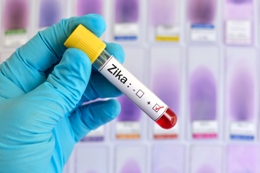02 February 2016
 A UniSA research laboratory is working with Melbourne-based biotech company Sementis Ltd to develop a vaccine to combat the mosquito-borne Zika virus which is fast becoming an urgent global health priority.
A UniSA research laboratory is working with Melbourne-based biotech company Sementis Ltd to develop a vaccine to combat the mosquito-borne Zika virus which is fast becoming an urgent global health priority.
UniSA’s Experimental Therapeutics Laboratory in partnership with Sementis has developed a protective vaccine for mosquito-borne Chikungunya virus which is now in the clinical manufacturing process.
Lab head Associate Professor John Hayball hopes his team can rapidly adapt the Sementis Chikungunya vaccine for Zika virus, which the World Health Organisation says is strongly suspected of causing birth defects and could infect three to four million people in the Americas over the next year. Already, Zika has been detected in 23 countries in the Americas.
Assoc Prof Hayball says Zika virus, for which there is currently no treatment, has caught the world ‘flat footed’.
“It’s really a race against the clock to find a vaccine for Zika virus and our lab is starting preclinical laboratory based experiments immediately,” Assoc Prof Hayball says.
The Experimental Therapeutics Laboratory together with Sementis developed a protective vaccine for Chikungunya virus late in 2015, and is currently finalising a contract for manufacturing clinical grade material which will be tested in toxicity studies and early phase clinical trials, with a full vaccine development process taking many years.
“The UniSA-Sementis team has taken the Chikungunya vaccine all the way through pre-clinical studies and shown it’s 100 per cent effective,” Assoc Prof Hayball says.
The Chikungunya vaccine was developed out of vaccine platform technology invented by Sementis and developed jointly by the UniSA-Sementis partnership.
“Using this vaccine platform, we use genetic engineering techniques to insert genes for antigens from different diseases, so Chikungunya genes to make the Chikungunya vaccine … and Zika genes to make the Zika vaccine,” Assoc Prof Hayball says.
“The platform is a bit like a cassette system that we can plug and play … so we plug the platform with different antigens to target a specific condition. The beauty of this vaccine platform is that it’s not a one-product platform. We’re continuing to work with Sementis on vaccines in their portfolio which include peanut and cat allergy.”
Zika virus is spread by the same group of mosquitoes that spread the Dengue viruses and Chikungunya virus, and are typically urban breeders called Aedes. Those infected with Zika virus may develop symptoms such as fever, rash and headache.
Assoc Prof Hayball says the work his lab has done with the Chikungunya vaccine shows the UniSA-Sementis approach with the vaccine platform is ‘rapid and effective’.
“What we’re hoping to do here is not only prove that our approach is the best way to make vaccines for emerging infectious diseases, but that we can really make a difference with this urgent situation,” he says.
“It’s an area that’s wonton for input and we have one of the most efficient and effective ways to make vaccines quickly.”
An alarming development from the Zika virus outbreak in Brazil in 2015 is the strong association with microcephaly, a birth deformity linked with women who have had Zika infection. While the link between microcephaly and Zika infection has not been conclusively proven, the evidence is sufficiently strong to warrant warnings against pregnant women travelling to areas of Zika activity.
Assoc Prof Hayball says it’s not only alarming how quickly Zika has emerged as a major global health problem, but it’s particularly alarming the virus has been linked to birth defects. In addition to starting on experiments for vaccine development, Assoc Prof Hayball has started collaborating with the University of Adelaide’s Robinson Research Institute on uncovering what mechanisms of the virus might cause birth defects.
“Working closely with Sementis on the Chikungunya vaccine has provided opportunities to our nine young scientists and is a perfect example of collaboration between industry and researchers to find solutions to real world problems and to create jobs and opportunities,” Assoc Prof Hayball says.
Contact for interview: Associate Professor John Hayball office (08) 8302 2315 mobile 0403 820 060 email john.hayball@unisa.edu.au
Media Contact Kelly Stone office (08) 8302 0963 mobile 0417 861 832 email Kelly.stone@unisa.edu.au
The World Health Organisation has today declared the Zika outbreak a global health emergency. You can support important health research such as that being undertaken by Assoc Prof John Hayball here.


